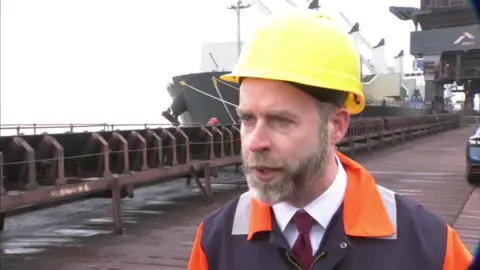UK cautious over future Chinese steel investment
 BBC News
BBC NewsThe government has admitted it would "look at a Chinese firm in a different way" when considering investment in the steel industry after being forced to seize control British Steel.
Business Secretary Jonathan Reynolds said steel is a "sensitive sector" after key raw materials needed to keep the company's blast furnaces running finally reached its Scunthorpe plant on Tuesday.
The government passed an emergency law to take control of British Steel amid accusations that its Chinese-owner Jingye was planning to switch the furnaces off.
Beijing has accused the government of "politicising trade co-operation" and said this situation had raised doubts about Chinese investment in the UK.
The government has so far stopped short of taking British Steel back into full public ownership but has not ruled out nationalisation, while also looking for potential private investors to fund operations.
But Reynolds said when it came to looking for potential investors: "I think you would look at a Chinese firm in a different way".
"[Steel] is a sensitive sector around the world and a lot of the issues in the global economy with steel come from over-production and dumping of steel products, and that does come from China," he added.
After its intervention at the weekend, the government then had to scramble to secure the supplies needed to keep Scunthorpe going.
Coking coal and iron ore from the US arrived at Immingham docks on Tuesday to be transported to British Steel's Scunthorpe site.
Reynolds said he was "keen to stress the action we've taken here was to step in, because it was one specific company that I thought wasn't acting in the UK's national interest".
Alasdair McDiarmid, assistant general secretary of the union Community, said the arrival was a "huge relief".
A separate shipment of materials is back on its way to the UK from Australia after a legal dispute over who owned the cargo was resolved between the government and Jingye.
If the furnaces were starved of fuel and went out, the UK would no longer have the capability to produce so-called virgin steel, due to the process of restarting them being extremely difficult and costly.
Virgin steel-making involves iron being extracted from its original source to be purified and treated to make all types of steel used in major construction projects, such as new buildings and railways.
The materials have been paid for by the government, which industry minister Sarah Jones said are covered by existing budgets.
"We have a £2.5bn fund for steel within the department for business so we won't be drawing down on any extra resources and people can be reassured of that," she told the BBC's Today programme.
The plant, which employs 2,700 people, is said to be in a "far better position" as a result of the government's intervention, according to union officials.
Asked if the government could guarantee there would be no job cuts at the North Lincolnshire steelworks, Reynolds there may be a "different employment footprint".
"That might be new technology, new facilities, that might have a different employment footprint. The staff here absolutely know that, they know they need a long-term future."
British Steel has been granted planning permission to build new "greener" electric arc furnaces which unions have claimed would lead to job losses.
'Bad faith'
In March, Jingye said the Scunthorpe site was losing £700,000 a day, which it said was "no longer financially sustainable", and the company began a consultation on job cuts.
Talks between officials and Jingye last week failed to produce a breakthrough.
The government said the company had rejected an offer of £500m in public money to help keep the furnaces operating, and had demanded more than twice as much with few guarantees it would keep the plant open.
"We were working in good faith on what we thought was a good deal on the table," said Jones.
"That relationship broke down when, in the middle of a consultation about the future of the site, they refused to buy the raw materials to keep that site going. That was an act of bad faith and that's why we had to intervene in the way that we did."
Reynolds previously said it "became clear" that Jingye was intent on closing down the blast furnaces no matter the financial support offered, prompting the government to secure control of the site.

Get our flagship newsletter with all the headlines you need to start the day. Sign up here.
